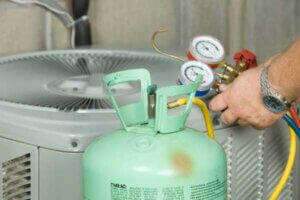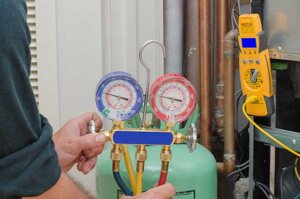AC refrigerants are one of the most important components of your air conditioning unit. These are chemical substances that enable your AC to work, by absorbing heat from the inside and releasing it outside. The process starts in the evaporator coil where the refrigerant absorbs heat and turns from liquid to gas. Then it moves to the condenser coil outside where it releases the heat and turns back into a liquid. This cycle continues, ensuring your home stays at a comfortable temperature. Thus, it is essential to use the right AC refrigerant for your air conditioning system to keep it running at peak efficiency.

There are several different types of AC refrigerants used today, but it is important not to mix these. This blog post will explain why this is dangerous and the possible consequences of doing it.
To learn more or have our experts check the refrigerant level in your AC, contact our heating and air conditioning team today.
Why Should You Not Mix Different AC Refrigerants?
There are several different types of AC refrigerants available in the market. These are meant for different AC units. They should not be mixed as it can lead to overheating and a reduction in your AC’s efficiency and lifecycle. Not only this, but it can result in harmful impacts on the environment.
Here are some of the reasons why you should strictly avoid mixing different AC refrigerants:
- It can lead to safety hazards: Mixing different AC refrigerants can be dangerous, as it can cause chemical reactions that release harmful gases into your home. These gases can become a threat to your health and might even cause a fire. It can also increase the system’s pressure, damaging your unit permanently.
- Reduction in your AC’s efficiency: Different AC refrigerants have distinct chemical properties and are meant to work with specific AC components. Mixing them together can put more strain on the air conditioning unit and make it run less efficiently, resulting in higher energy bills.
- It can damage your air conditioning unit’s components permanently: Lastly, mixing different AC refrigerants can lead to corrosion, and can damage various parts of the AC system, like the compressor and condenser coil. This can result in costly repairs in the future or even cause the entire system to fail.
Different Types of AC Refrigerants

Now that we have talked about why mixing different AC refrigerants is not advisable, let’s have a look at some common types of refrigerants.
- R-22: This refrigerant is known as Freon. It was a popular and commonly used AC refrigerant until recently. It has been found to be incredibly dangerous to the environment and thus, it’s being phased out now across the United States. If your unit still uses Freon, it must be retrofitted to use a different AC refrigerant.
- R-404A: This refrigerant is used for commercial refrigeration and air conditioning systems because of its low environmental impact.
- R-410A: This is one of the most popular alternatives to the R-22 refrigerant. The R-410A refrigerant is now being used in newer AC models after the phasing out of the R-22. This one is not only better for the environment, but it’s also more energy-efficient.
Contact Galmiche & Sons for AC Refrigerant Inspection and Refill Services in St. Louis
To sum it up, it is incredibly important to ensure that you are using the right refrigerant in your air conditioning unit and not mixing it up with others. This is important to keep your AC system running efficiently, safely, and for a long time.
If you need to get your AC refrigerant level inspected or refilled in St. Louis, call Galmiche & Sons! Our experienced HVAC technicians will have a thorough look at your AC unit, refill the refrigerant, and fix all other issues in no time!












